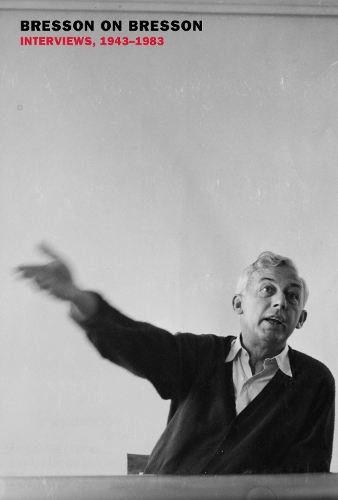
Bresson On Bresson: Interviews, 1943-1983
(Hardback, Main)
Publishing Details
Bresson On Bresson: Interviews, 1943-1983
By (Author) Anna Moschovakis
By (author) Robert Bresson
The New York Review of Books, Inc
The New York Review of Books, Inc
15th November 2016
Main
United States
Classifications
General
Non Fiction
791.430233092
Physical Properties
Hardback
352
Width 160mm, Height 235mm, Spine 20mm
550g
Description
One of the most influential directors in the history of French cinema, Robert Bresson (1901-1999) never strayed from his iconoclastic ways: insisting on the use of non-professional actors, shunning the "advances" of Cinerama and Cinemascope (and the work of most of his predecessors and peers), mincing no words about the damaging influence of capitalism and the studio system on the - still developing, in his view - art of film. Organized chronologically, this collection of interviews and testimonials reveals the development of Bresson's thought over the course of forty years, punctuated by recurring mantras such as "Sound cinema invented silence," "Characters don't make a film; a film makes its characters," "Cinema is a form of writing" and - paraphrased from the bible - "Every idle word shall be counted." His integrity and originality earned him the respect of younger innovators, notably the filmmakers of the French New Wave, whose importance he recognized from the start. Perhaps the most striking cumulative effect of this palimpsest of self-interpretation is the revelation, beneath the apparently hyper-controlled aesthetic of Bresson's films, of a near-religious belief in the value of intuition: not only that of the creator, but that of the general public, which he claims to deeply respect: "People are always ready to feel before they understand. And that's how it should be."
Reviews
"We are still coming to terms with Robert Bresson, and the peculiar power and beauty of his films."
Martin Scorsese
"The collection Bresson on Bresson: Interviews 1943-1983 and Bresson's own Notes on the Cinematograph are primers for the gradual understanding of Robert Bresson, to paraphrase Gertrude Stein...The interviews in Bresson on Bresson are grouped chronologically and organized by film. Reading it, one can see Bresson refining his answers to the similar questions that inevitably arose with each new production, even as he refined his filmmaking style." J. Hoberman, The New York Times
"Bresson was the only director who knew how to captivate and surprise me. I consider him a unique phenomenon in the world of film."Andrei Tarkovsky
"Bressons characters, his movies, and Bresson himself all become icons. . . . Bresson has transcended himself: he is blazed in mosaics in some moss-grown temple."Paul Schrader
"The power of Bresson's...films lies in the fact that his purity and fastidiousness are not just an assertion about the resources of the cinema, as much of modern painting is mainly a comment in paint about painting. They are at the same time an idea about life, about what Cocteau called 'inner style,' about the most serious way of being human." Susan Sontag
"Cinephiles will delight in reading this book and following Bressons thinking as it develops further and makes each interview more compelling than the last.Publishers Weekly
"To not get Bresson is to not get the idea of motion pictures--it's to have missed that train the Lumire brothers filmed arriving at Lyon station 110 years ago." J. Hoberman,The Village Voice
"Robert Bresson's 13 features over 40 years constitute arguably the most original and brilliant body of work over a long career from a film director in the history of cinema. He is the most idiosyncratic and uncompromising of all major filmmakers." Alan Pavelin,Senses of Cinema
Author Bio
Robert Bresson (1901-1999) was a renowned French film director, whose work was characterized by his minimalist style and interest in actor (or "character") movement. Bresson directed thirteen films over forty years, including Au hasard Balthazar (1966), which is considered his masterpiece. NYRB will also publish Bresson's Notes on the Cinematograph in the Fall 2016 season. Anna Moschovakis is a poet, translator, and editor. She is the author of several books of poetry, including I Have Not Been Able to Get Through to Everyone (2006) and You and Three Others Are Approaching a Lake (2011), winner of the James Laughlin Award. Her translation from the French include Georges Simenon's The Engagement (2007), Annie Ernaux's The Possession (2008), and Albert Cossery's The Jokers (2010).
